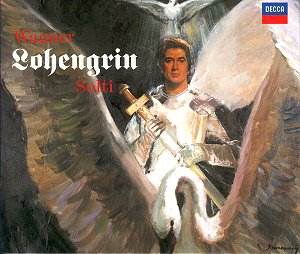This release is a part of Decca’s massive re-mastered Wagner
Collection of all the Solti operas excluding The Ring. The only
thing about this box, is that since it was originally recorded digitally,
there has been no need for extensive re-processing unlike the earlier
recordings. The original recording was always very good, and so I cannot
discern any great difference between the original and this release.
When it was originally released, it was very well received
and not much has changed today. The primary competition comes from the
Rudolf Kempe set on EMI. In direct comparison the Decca set wins hands
down. It is arranged so that the acts are divided between the discs
in such a way that there is only one mid-Act break whereas the EMI set
issued on three discs has each Act broken by a disc change. The same
consideration applies to the Karajan version (also EMI) although the
performance is not quite in the same class as the previous two.
Those who find Solti usually highly charged and fiery
can rest assured that this set is a revelation in this respect. I haven’t
heard such a relaxed interpretation of Wagner from these forces and
it was quite a surprise. The Prelude to Act Three promised to be a very
exciting experience. I was expecting the normally jabbing Solti to make
a real meal of it; instead we have quite a "normal" reading
of the prelude, and this characterises the whole performance.
The main item which usually causes heated discussions
between fans of the composer is the choice of singers. There is no less
of a problem here, as nearly all of the available sets are equally strong
and weak in places; you pays your money and you takes your choice. Kempe’s
set has Jess Thomas, Elisabeth Grummer, Dietrich Fischer-Dieskau and
Christa Ludwig, as the main singers. Fischer-Dieskau sings in both,
but taking the part of The King’s Herald in the Solti, and as Telramund
in the Kempe. The main beauty of the Decca set is Placido Domingo and
I suspect that his many fans will not need any persuasion to go out
and buy this set for this reason alone.
There are a couple of more modern sets also available,
conducted by Claudio Abbado (DG), and Daniel Barenboim (Teldec). Neither
of these offers significant competition to the Decca and EMI sets. In
the final analysis what may swing it for you is the recording quality.
Whereas the Kempe set, (beautifully sung and played) is re-mastered
from a rather old analogue recording, the Decca sounds as good as any
in sparkling digital sound. Add to this the singing of Placido Domingo,
who although not at the peak of his singing career (which fell some
5–6 years earlier) was still good enough to be superb in the part of
Lohengrin. There is not a trace of the Heldentenor type of voice normally
heard in this part, more a plainly lyrical sound which I find very appealing.
For fans of Domingo, as soon as he opens his mouth, it could be none
other that Domingo, which is all his many fans will want.
Decca’s production is superb, with full synopsis and
libretto. My only small carp is that the set is issued at full price.
It comes in at a lower price if you purchase all of the operas in the
Solti-Wagner set.
John Phillips
